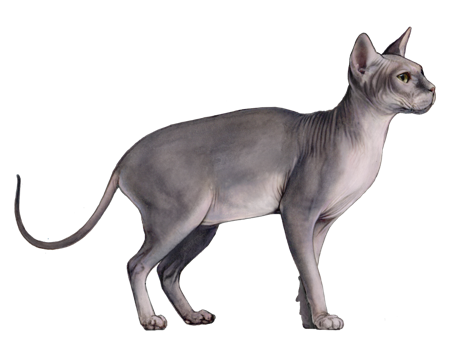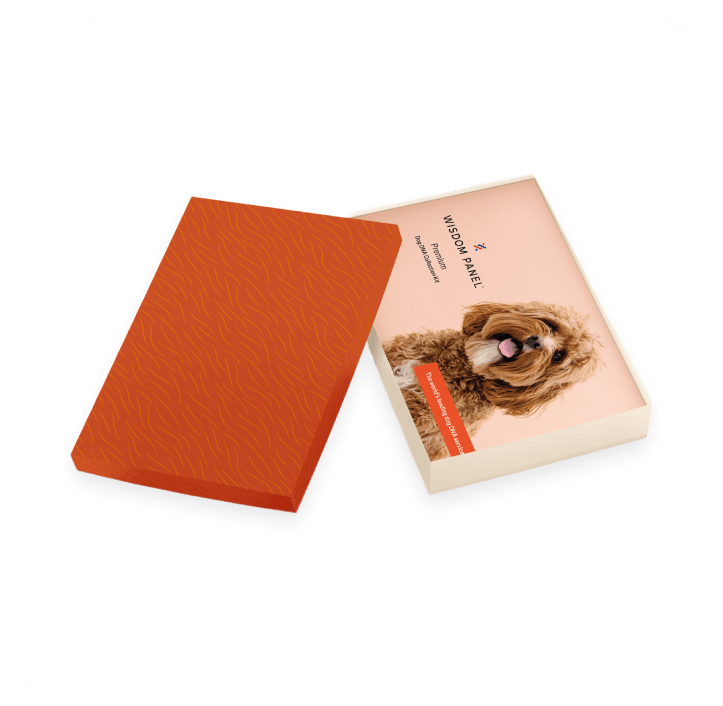
Donskoy
Donskoys are intelligent, friendly cats with adorably wrinkled skin. Their social, playful nature makes them well-suited for families looking for an energetic, loyal companion.
Interested in discovering if your cat is a Donskoy?
Check out Wisdom Panel's DNA test.
Donskoy Traits
General Appearance
The Donskoy is a medium-sized cat with a hard, muscular body, well-rounded belly, and wrinkled skin that's velvety to the touch.
Coat and Coloring
Donskoys have four coat types: rubber bald, flocked, velour, and brush. Rubber bald cats are born without hair and remain hairless their entire lives. Flocked cats appear hairless but actually have a thin coat (which may disappear over time) with the texture of a soft chamois. Velour cats are born with a bald spot on the top of the head, and their wavy coat disappears gradually within the first year. Brush cats have bristly, soft, wavy, or wiry fur, and only a portion of their coats disappears. All types come in a variety of colors.
Distinctive Physical Traits
Donskoys have several other distinguishing features. These include large, wide ears, large almond-shaped eyes, excessively elastic skin, and long, slim toes separated by webbing.
Donskoy Temperament
This affectionate, good-natured breed thrives on companionship. Donskoys love to participate in all family activities and are friendly with other pets and kids. They want to be surrounded by people who genuinely enjoy interacting with them. Because they're so social, they shouldn't be left alone for long periods. If you regularly must be away for hours, consider getting your Donskoy a "sibling" pet for company.
These active, frisky cats enjoy playing and even make up their own games to keep themselves entertained. Donskoys also have an insatiable curiosity and are thus best for homes that offer plenty of places to explore. Interactive or puzzle toys will also keep their bodies and minds busy.
Donskoy History
The Donskoy—also known as the Don Sphynx—originated near the Don River in Russia in 1987. There, Elena Kovaleva saw kids abusing a kitten and intervened. She brought the kitten home and named her Varvara. When Varvara started shedding her fur, Elena chalked it up to stress from her traumatic experience.
Two years later, Varvara gave birth to a litter of kittens. Some were born hairless, and the others started with hair but lost it like their mother. Taken by this unique trait, cat breeder Irina Nemikina adopted one of the kittens and used it as the foundation for a new breed: the Donskoy.
Over time, breeders learned more about the Donskoy's hair loss gene. Unlike the recessive gene carried by the Sphynx, the Donskoy's gene is dominant. So, all cats with the gene either are born hairless or lose their coats as they grow.
The Donskoy breed received recognition from the World Cat Federation in 1997 and TICA in 2005.
Donskoy Care
Nutrition
Donskoys require a high-quality diet. Because nutritional needs vary for kittens, adults, and senior cats, opt for a formula that's age-appropriate for your pet.
All cats are at risk of obesity, especially as they age and their activity levels decline. To help your Donskoy maintain a healthy weight, measure out meals and reduce portions if necessary. And don't forget to account for treats. As a guideline, they should make up no more than 10% of a cat's calories.
Lastly, all cats need access to fresh, clean water around the clock.
Grooming
Hairless Donskoys don't require brushing, but they do need grooming to remove excess oil from their skin. Wiping them down daily with a wet towel and bathing them every week or two does the trick. Be sure to pay special attention to their nail beds, nose, and ears, as these places tend to collect debris. To protect your Donskoy from sunburn, use a veterinarian-approved sunscreen whenever they're outdoors.
Most cats' nails require monthly trimming to prevent them from getting too long. Long nails are more likely to snag on something and become torn or damaged. They can even grow into your cat's paw pads, leading to pain or infection. In addition to clipping, providing a scratching post will allow your cat to do some nail maintenance themselves (thanks to their instinct to scratch).
Good dental hygiene is essential to a Donskoy's overall health. An ideal dental routine includes daily at-home teeth brushing combined with visits to the veterinarian for professional dental cleanings and exams.
Health
Roughly one out of every three cats in the United States is overweight or obese. And those extra pounds can contribute to other health risks—such as arthritis, diabetes, and heart problems. Your veterinarian is the best resource for tips on managing your cat's weight.
Breed Group
Western
The largest of breed groups, the Western Group is mainly comprised of cats developed in Europe and the Americas. Due to the complexity of feline genetic diversity, however, cat breeds from other regions may also be found associated with this group.
Resources
https://tica.org/breeds/browse-all-breeds?view=article&id=839:donskoy-breed&catid=79
https://www.petguide.com/breeds/cat/donskoy/
https://www.omlet.co.uk/breeds/cats/donskoy_-_don_sphynx_cat
https://tica.org/phocadownload/dsk.pdf
https://tica.org/breeds/browse-all-breeds?view=article&id=1876
https://www.banfield.com/state-of-pet-health/obesity
Reviewed February 23, 2021 by Annette Louviere, DVM






































